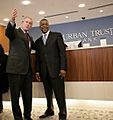African Americans facts for kids
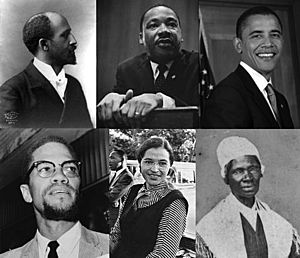
An African American is usually a person living in the United States who speaks English. Their ancestors came from Africa. This term can also describe a person born in Africa who moves to the U.S. and becomes a citizen. Sometimes, it's used for people of African background who live in other parts of the Americas.
The term "African American" is often linked to "black people" because many African Americans have dark skin. This is due to their ancestors coming from Sub-Saharan Africa. Many Africans were brought to the United States during the slave trade. A large part of the U.S. population is African American, especially in cities. Many also live in rural areas in the Southern United States. Detroit has a very high percentage of black people. Other cities with many African Americans include Jackson, Mississippi; New Orleans; Memphis; Miami Gardens; and Savannah, Georgia. New York City and Chicago have the largest numbers of African Americans.
States with a high percentage of African Americans are Mississippi, Louisiana, Georgia, Maryland, South Carolina, Alabama, Delaware, North Carolina, Virginia, and Tennessee. African Americans are the third-largest ethnic group in the United States, after White Americans and Hispanic and Latino Americans.
Contents
What Does African American Mean?
The term African American describes different cultures connected to Africa. It was created to show a link to Africa for people who are American. This is similar to how we say Italian Americans or Irish Americans. The difference is that Italian Americans know their ancestors came from Italy, not just general Europe.
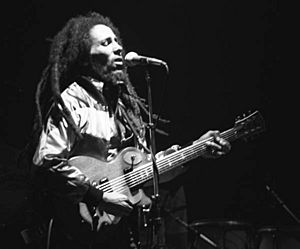
The "African" part of African American shows a connection to many African cultures, not just one. The "American" part shows their nationality and culture from the United States. For example, a person born in Nigeria is Nigerian, even if they move to the U.S. and live there forever. Their children born in America could call themselves Nigerian American or African American.
Some people from the Caribbean, like Jamaicans, do not identify as African American, even if their ancestors were from Africa.
The Term "Black"
In America, the word "black" is sometimes used for other groups around the world who might not see themselves as black, like Australian Aborigines.
Many black people chose the term "African American" because they found the older term "Negro" offensive.
In America, there are many immigrants from different backgrounds who have some African ancestry. These include people from Cape Verde, the Dominican Republic, Cuba, Brazil, and Puerto Rico. These groups often do not see themselves as Black or African American and prefer not to be called that.
Because there are so many different mixed race backgrounds in America, mixed-race Americans also do not want to be forced to identify as only black or white.
Family History and Genetics
Many African Americans have ancestors from Europe and Native American groups, as well as from Africa.
Studies using genetic testing have shown that African Americans have different ancestries. These studies found that, on average, African Americans have mostly West African ancestry (73-82%). They also have European ancestry (16-24%) and a small amount of Native American ancestry (0.8-1.2%). There are big differences from person to person. Some studies even found that 38% of African Americans have Irish ancestry.
History of African Americans
Most of the first African Americans were brought to North America as part of the Atlantic slave trade. African slaves were brought here from 1619 to 1808. After the United States became independent, slavery became illegal in most Northern states. But at the same time, slavery became more important for the economy in the Southern states.
Many African American slaves worked on large farms called plantations where they grew cotton and tobacco. This work was very hard, and slaves were often physically punished. It was also against the law for slaves to learn how to read and write.
At the same time, there were many free African Americans in the North. Unlike slaves, they could start churches, write newspapers, and sometimes own property. Frederick Douglass was an important person who fought against slavery. Harriet Tubman helped create the Underground Railroad, a secret network that helped African Americans escape from slavery and become free.
During the American Civil War (1861-1865), the Southern states left the United States to form the Confederate States of America. The United States won the war. In 1865, all slaves (about 4 million people) were freed by the 13th amendment to the U.S. Constitution.
Even though African Americans were no longer slaves, white Southerners passed laws called Black Codes. These laws took away many of their freedoms. Some African Americans did serve in government, but after 1877, white Southerners mostly kept them out. White people also formed groups like the Ku Klux Klan to scare African Americans and stop them from voting.
Most Southern African Americans became sharecroppers. Sharecropping was a system where farmers rented land from a landowner and had to pay the landowner with a part of their crops. Jim Crow laws also separated white and black people. Black people had to go to different schools and usually live in different neighborhoods. Many businesses were only for white people. The Supreme Court case Plessy v. Ferguson said that black and white facilities could be "separate but equal," but the facilities for black people were almost always worse. African Americans often faced extreme violence and unfairness.
In the early 1900s, African-American culture grew with the Harlem Renaissance. This was an artistic and literary movement in New York City. The NAACP was founded to improve the lives of African Americans. Leaders had different ideas about what was best. Booker T. Washington thought they should go to vocational schools to get better jobs. W. E. B. Du Bois believed university education was more important. Marcus Garvey thought African Americans should move to Africa to have their own country.
During the Great Migration, from the 1910s to the 1960s, African Americans moved from the South to cities in the North and West. But segregation also existed in the North. Sometimes, rules called redlining stopped people in African-American neighborhoods from buying homes.
In the 1950s and 1960s, the Civil Rights Movement called for equality between African Americans and white people. In 1964, the Civil Rights Act was passed. This law made it illegal to treat people unfairly based on their race and other things.
Language and Society
The Africans brought to America as slaves came from different countries and spoke many different languages. They became a new mixed group with a new language: English. Their American-born children were the first generation of English-speaking African Americans. In the second half of the 1900s, more black people learned to read.
Culture
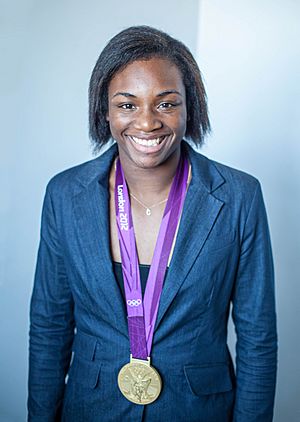
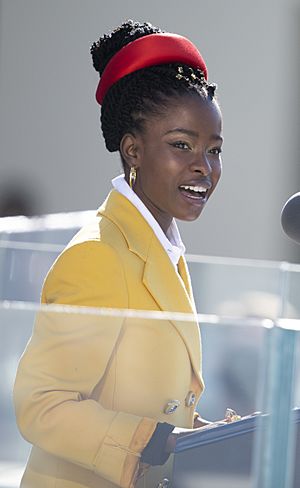
African Americans have greatly influenced many types of music. These include Hip hop, R&B, funk, rock and roll, soul, blues, and other modern American music styles. Older black music forms included blues, doo-wop, barbershop, ragtime, bluegrass, jazz, and gospel music.
Michael Jackson, an African-American pop singer, released Thriller in 1982. It is the best-selling album of all time. In the 1990s, Beyonce Knowles became famous as the lead singer of the R&B girl group Destiny's Child. In the 2000s, she started making music on her own. African-American rappers like Lil Wayne, Jay-Z, Kanye West, 50 Cent, Flo Rida, and Drake are some of the best-selling artists.
Black culture has also been shown in documentaries. For example, Black Is, Black Ain't looks at black identity. Good Hair talks about how important "good hair" is for black women in American culture.
There is a National Museum of African American History and Culture in Washington D.C.
Protestant Christianity is the most common religion among African Americans.
Soul food is a type of cooking eaten by African Americans in the South. Typical soul food includes fried chicken, mac and cheese, cornbread, and candied yams.
Kwanzaa and Juneteenth are popular African-American holidays.
Popular African-American fashions include hip-hop styles like durags, sagging jeans, and grillz (gold teeth covers). African American hairstyles include dreadlocks and cornrows.
Quick Facts About African Americans
- African Americans are people who live in America and speak English, but their ancestors came from Africa.
- Since there are many African countries, an American whose ancestors are from Nigeria, Africa, could call themselves either African American or Nigerian American.
- Most of the time, African Americans are called "black people."
- Many Africans were brought to the southern United States during the Atlantic slave trade.
- There were many free African Americans in the North.
- Many immigrants in America who are of mixed race do not call themselves "black" or "African Americans."
- Black people used to be separated in schools, especially in the South.
- Other unfair rules were put on African-American people in the South because of their skin color.
- Many African Americans have their own culture, seen in their music, clothes, religion, food, and celebrations.
See Also
- List of African-American women in STEM fields
- African American Vernacular English
- African American history
- Alexander Crummell
Images for kids
-
The first slave auction at New Amsterdam in 1655, illustration from 1895 by Howard Pyle
-
Reproduction of a handbill advertising a slave auction in Charleston, South Carolina, in 1769
-
Crispus Attucks, the first "martyr" of the American Revolution. He was of Native American and African-American descent.
-
Frederick Douglass, ca 1850
-
Harriet Tubman, around 1869
-
Rosa Parks being fingerprinted after being arrested for not giving up her seat on a bus to a White person
-
March on Washington for Jobs and Freedom, August 28, 1963, shows civil rights leaders and union leaders
-
Proportion of Black Americans in each county of the fifty states, the District of Columbia, and Puerto Rico as of the 2020 United States Census
-
Graph showing the percentage of the African-American population living in the American South, 1790–2010. Note the major declines between 1910 and 1940 and 1940–1970, and the reverse trend post-1970. Nonetheless, the absolute majority of the African-American population has always lived in the American South.
-
This graph shows the real median US household income by race: 1967 to 2011, in 2011 dollars.
-
BET founder Robert L. Johnson with former U.S. President George W. Bush
-
A traditional soul food dinner consisting of fried chicken with macaroni and cheese, collard greens, breaded fried okra and cornbread
-
Mount Zion United Methodist Church is the oldest African-American congregation in Washington, D.C.
-
Michelle Obama was the First Lady of the United States; she and her husband, President Barack Obama, are the first African Americans to hold these positions.
-
Racially separated Negro section of keypunch operators at the US Census Bureau
See also
 In Spanish: Afroestadounidense para niños
In Spanish: Afroestadounidense para niños
 | Bayard Rustin |
 | Jeannette Carter |
 | Jeremiah A. Brown |



















